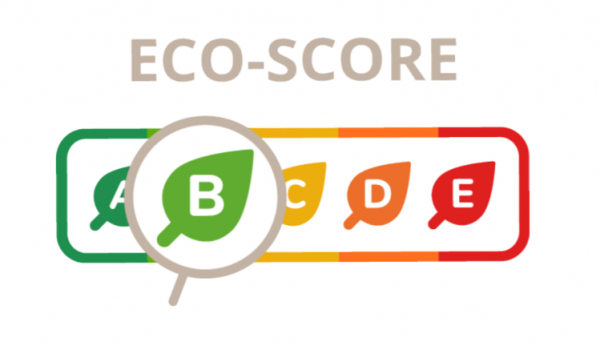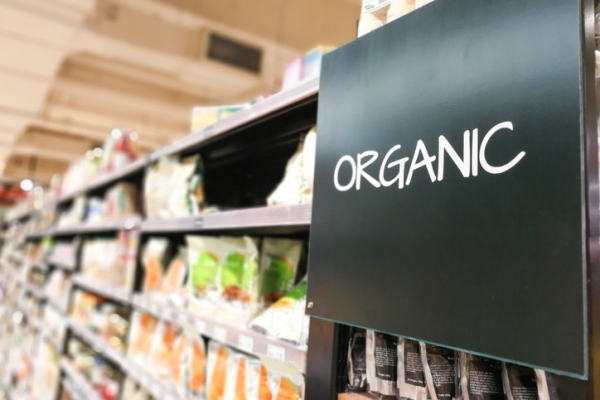European organic association launches lawsuit over environmental labelling: ‘It’s an attempt to kill Eco-Score’

Eco-Score is a front-of-pack labelling system developed in France to communicate the environmental footprint of food in much the same way Nutri-Score informs consumers about nutrition. Created by a consortium of French food tech companies, Eco-Score was their answer to growing concerns over greenwashing and the proliferation of environmental labelling and certification schemes.
The system ranks food products on the basis of their overall environmental impact, providing a score out of 100 that corresponds to a letter and colour (dark green to red, A to E). The score is calculated through an equation: Eco-Score = life cycle assessment (LCA) + bonus points – points deducted.
Data on the LCA is drawn from an analysis of more than 2,500 product categories available in the Agribalyse database. This is based on the Product Environmental Footprint (PEF) method and considers issues such as climate change, water use, land use and acidification.
The developers say it is ‘transparent’ and ‘can be easily understood and applied by all players’.
But not everyone agrees. “Instead of fighting greenwashing, labelling schemes like the Eco-Score contribute to it,” according to Jan Plagge, President of IFOAM Organics Europe. “The organic movement is concerned about the spread of such labelling schemes in several EU countries.”
In an attempt to block the uptake of the Eco-Score label, IFOAM Organics Europe and the French Association of IFOAM Members (Association Française des Adhérents de l'IFOAM) are bringing legal action before the Paris Court of Justice.
The legal basis of the Eco-Score challenge
The case targets Eco-Score’s developers and backers: ADEME (the French agency for the ecological transition); the company Yuca, operator of the Yuka platform; the company ECO2 Initiative, operator of the Etiquettable platform; and the Association Open Food Facts.
IFOAM Organics Europe and the French Association of IFOAM Members are seeking the ‘termination of use’ of the environmental labelling system, which they say is ‘unfair to organic food production and deceptive for consumers’.
On what basis are they making this claim? Article 30 of the EU Organic Regulation states: “The terms listed in Annex IV and their derivatives and diminutives, such as ‘bio’ and ‘eco’, whether alone or in combination, may be used throughout the Union and in any language listed in that Annex for the labelling and advertising of products referred to in Article 2(1) which comply with this Regulation.”
The organic food associations insist that the Eco-Score format therefore ‘unlawfully associates the diminutive ‘eco’ with non-organic certified products’, reaching the conclusion that the label is ‘likely to create confusion among consumers, not only in France but more widely in Europe, between products from conventional production and those from organic production.’
Responding to the case, Katia Merten-Lentz, Partner and Founder Food Law Science & Partners – a legal expert who is not directly involved in the case – said that, while she ‘would not say [it has] legal merit’, the argument ‘at least has a legal rationale’.
“It could be argued on this legal basis that the term Eco-Score could be misleading for the consumer as to the organic nature of the product. But this is debatable,” she told FoodNavigator.
Does Eco-Score put organic at a disadvantage?
Beyond whether the term ‘eco’ could mislead consumers, it would seem that the crux of IFOAM’s objections lie in the calculation that underpins Eco-Score. One, they say, that puts organic producers at a disadvantage.
“The benefits of organic farming for the environment are clearly established in the scientific literature, and its development is the best way to achieve an agri-environmental transition of our food systems,” insisted Jacques Caplat, President of the French Association of IFOAM Members. “In an already difficult context of inflation for producers and consumers, attacks on organic farming, whether linked to the use of misleading terms or biased methodologies, must be stopped. Terms that are only allowed on organic food products by EU regulations should not be used for other purposes, and certainly not on food products that are not very environmentally-friendly as is currently the case with the Eco-Score.”
The rating methodology used was recently questioned by the European Commission in the context of the draft Directive on green claims, IFOAM suggested. This was because it does not consider all the ‘objective dimensions’ that are ‘essential’ for the development of a reliable environmental labelling. Instead, it favours ‘intensive and conventional production’ and fails to take issues like biodiversity into account, Plagge maintained.
Yuka’s Co-Founder François Martin agrees that, at the end of the day, this dispute is really about the methodology that Eco-Score is built on. But that is where the consensus ends. “It's an attempt to kill the Eco-Score, to favour the Planet Score (the score that has been created by the organic industry, for the organic industry). This score basically tells you that everything that is organic is good for the environment,” he told FoodNavigator.
Green competition: Eyeing the environmental euro
Martin is dismissive of the idea that using the term eco could confuse consumers. “Of course not,” he responded. “In France, we use ‘bio’ to designate organic products, so there is no risk of confusion.”
IFOAM insists that it supports the provision of environmental information to consumers. “It is more important than ever to better inform consumers about the environmental value of their food choices. But this must be done in compliance with the European legislation on organic farming as regards the terms used,” argued Plagge.
Martin is nevertheless suspicious that this lawsuit is more about protecting organic’s status as the dominant form of environmental labelling and certification than protecting either consumers or the planet. “Right now, the only environmental [label] that exists is the organic one. They have a monopoly. So, if people discover that organic does not always mean good for the environment, it's not good for their business.”
Merten-Lentz agrees that the motivation of IFOAM might be a little more complex than wording of the lawsuit suggests. “It can be wondered whether their motivation is purely a semantic one or if it is another attack on Yuka-type companies. To understand their deep motivation, it appears legitimate to question whether IFOAM would be satisfied with an ‘Enviro-Score’ rather than the Eco-Score they challenge. Indeed, they may actually be opposed to environmental labelling as a whole, for fear, for example, that the consumer will discover that organic products do not necessarily have a better carbon footprint than non-organic products,” she told this publication.
Regardless whether IFOAM is playing it straight when it highlights concerns over greenwashing and transparency, Merten-Lentz believes the spat highlights some shortcomings in current footprinting calculations. “These initiatives require companies to substantiate their claims about the environmental footprint of a food by using standard methods to quantify them. However, the calculation methods behind these labels still need to be refined. For example, the Product Environmental Footprint (PEF), which could become the main method for calculating the environmental impact of a product (it is not yet clear whether it will be applied to food), has some shortcomings. The use of pesticides is not taken into account in the calculation, nor are production methods. This means that the score could be the same for intensive and organic farming. In addition, the PEF method would not allow for any distinction between certain food categories such as an animal product and its plant equivalent.”
As companies compete for share of the green-euro, it is likely that legal challenges to environmental claims will rise, she continued. “No doubt, companies that feel disadvantaged by the calculation methods will always try to challenge them. The much-criticised Nutri-Score, to which Italy (among others) is strongly opposed as it would disadvantage their ham and olive oil producers, is a perfect example of this.”
Will IFOAM get its day in court? "We will see, I don't know yet this will be defended in court," Martin told us.










